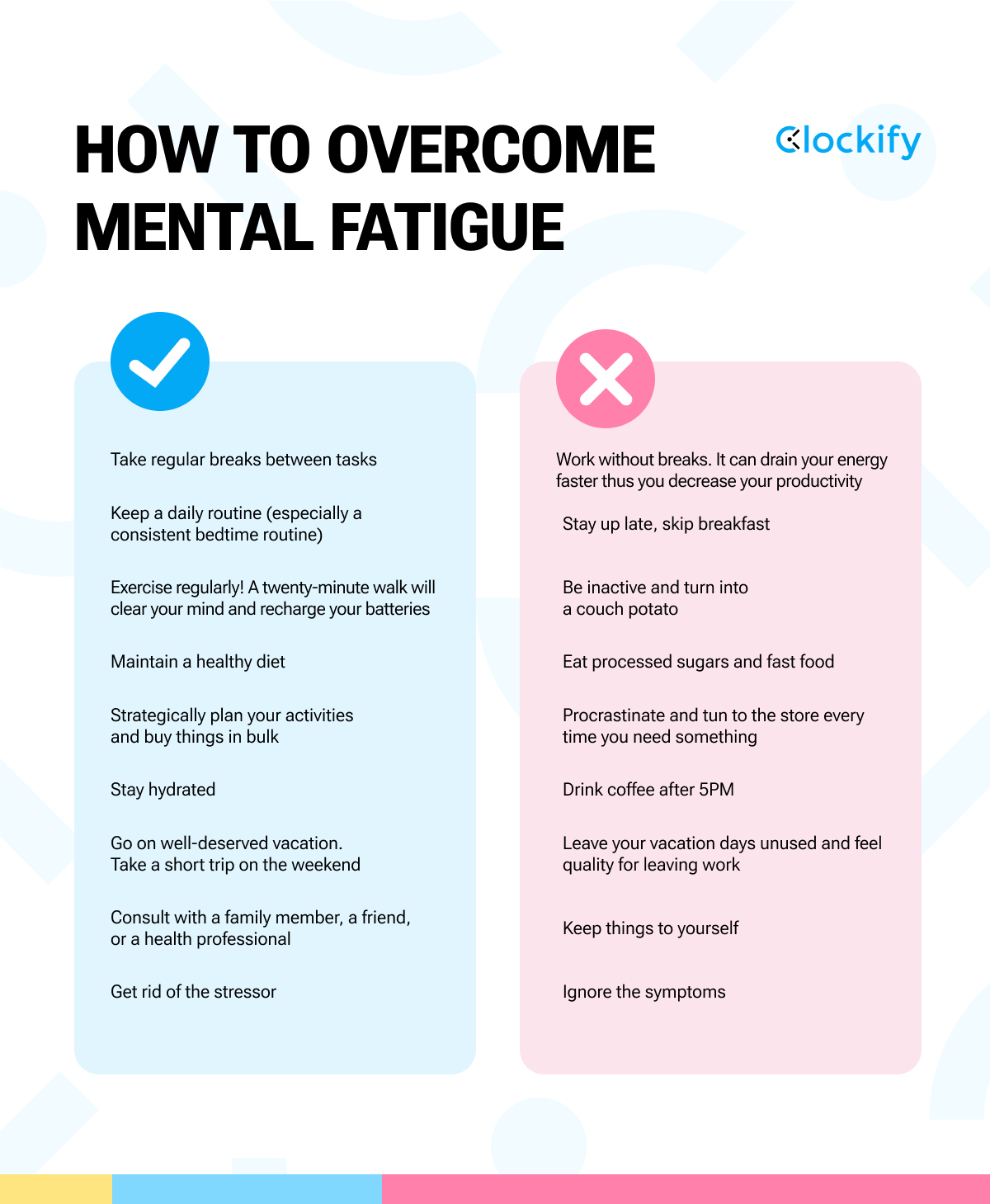I can…’t do it.
Do you feel like your emotional batteries are drained? Maybe you have a hard time concentrating on the simplest tasks. It happens to every single one of us.
As a matter of fact, a recent SHRM survey showed that almost 50% of US employees feel physically or mentally drained when their work ends. What’s more, 34% of Americans with children feel emotionally exhausted from work, while this feeling is shared with 43% of US adults without kids.
Still, being tired doesn’t always signify physical exhaustion. Once in a while, we may feel emotional tiredness, commonly referred to as mental (brain) fatigue or mental exhaustion.
Like any other resource, our mental energy can be used up. The good news is — if we recognize the signs of exhaustion and act adequately, energy becomes a renewable resource.
In line with that, in this blog post, we talk about:
- Mental fatigue symptoms,
- Common mental exhaustion causes, and
- Tips on managing mental fatigue.

Table of Contents
What is mental fatigue?
Mental fatigue is a brain exhaustion people experience after a lengthy cognitive performance and exposure to stress. Those who experience mental fatigue have a hard time:
- Maintaining attention,
- Doing minor tasks, and
- Filtering relevant information.
Mental exhaustion is a so-called modern disease as it comes with contemporary ways of living. Nowadays, most jobs are knowledge-based and demand mental effort. As a result, people have too much on their plate:
- Long working hours,
- Families,
- Commuting,
- Mortgages, and
- Deadlines.
How experts define mental fatigue
To ensure you comprehend the scope of mental fatigue, we contacted experts to ask them for their definitions and thoughts on mental exhaustion.
Founder and CEO of Hands to Guide You, Dr. Larry Ford, provided his definition:

“Sometimes brain fatigue feels like total exhaustion to someone who is in treatment or recovery of a physical ailment and the mind doesn’t have the bandwidth to focus — on anything. There’s a lack of interest in tasks and activities one typically enjoys.”
Moreover, the director of Clinical Services at TMS & Brain Health, Dr. Timothy Lyons, shared his take:

“It makes sense that mental fatigue is becoming more important to talk about when you consider the amount of digital stimuli we’re constantly interacting with. Mental fatigue is the feeling of exhaustion in the mind after it has been exerted or overstimulated. Your muscles, limbs, and overall body may feel completely normal, but when you’re mentally exhausted, your brain is what needs rest.”
He adds that mental fatigue usually occurs as a consequence of extreme pressure:

“Mental exhaustion can be likened to lapses in the cognitive function you likely experience after long periods of mental effort or exertion, like a week spent trying to wrap up a big project to meet a tight deadline, as well as shorter periods of intense stimulation such as taking a big exam or solving a complex dilemma. Sometimes when we’ve been exerting our brains, it can become difficult to solve problems, think critically, and remember things.”
Here’s how psychiatrist and CEO at PsychPlus, Faisal Tai, explains mental exhaustion:

“If left unaddressed, long-term stress can prompt simple tiredness to worsen and turn into long-term mental fatigue, or mental exhaustion. This state is usually characterized by impaired cognitive skills such as:
- Memory,
- Thinking, and
- The ability to make decisions and solve problems.”
How a clinical counselor recognized mental fatigue
A Licensed Clinical Professional Counselor and Certified Grief Specialist, Linda Whiteside, shared her experience with mental fatigue:

“As a licensed professional clinical counselor with decades of experience, I’m supposed to be used to working long hours of counseling sessions for my patients. However, when the pandemic hit, there was an influx of patients in our treatment center that needed mental health counseling, and the only way we could accommodate them would be through back-to-back subsequent scheduled Zoom meetings.”
Linda adds that she had a lot of patients with mental fatigue signs:

“I was feeling overwhelmed by the number of patients I was counseling. I was exhibiting signs and symptoms of mental fatigue such as poor sleep, missing meals due to slight cognitive dysfunction, being on edge, irritable, and anxious for my patients’ wellbeing.”
She points out that working long hours had some negative effects on her mental health:

“It was really a distressing time, and my mental fatigue pushed me to take a two-week health break. Thankfully, as the months passed and things got better, the scheduling scheme was better and more counselors were available so I didn’t have much on my plate like before — lessening my risk of mental fatigue.”
What is not mental fatigue?
Mental fatigue is used interchangeably with different terms. To make sure that you have a full grasp of what mental fatigue means, we are highlighting the differences between mental fatigue, stress, and brain fog.
Stress vs. mental fatigue
Mental fatigue and stress do not have the same meaning.
Stress is triggered by external sources. It can be short-term, such as a traffic jam on your way to work, or long-term — chronic illness, divorce, or caring for aging parents. Whatever the cause, stress is inevitable.
On the other hand, mental fatigue is a severe form of tiredness and, subsequently — a result of long-term stress. It can be acute or chronic.
Acute exhaustion is short-term and can happen after a hectic day. When you don’t manage it properly, acute fatigue can become chronic.
Chronic fatigue can result in burnout — the feeling of being physically and mentally depleted. It is usually prevalent among community workers (social workers, health care workers, military personnel, etc.). For instance, a study on professional burnout found that 54% of psychiatric technicians (out of 151) experienced extreme mental fatigue. What’s more, 38% of them reported feeling detached from themselves.
💡 Clockify Pro Tip
Law enforcement professionals and community workers most commonly experience emotional labor. Learn more about it here:
Brain fog vs. mental fatigue
Even though they might appear similar, brain fog and mental fatigue are not the same conditions. Dr. Lyons helped us make out a difference:

“Brain fog and mental fatigue share many similarities in how they might affect our lives, but they aren’t the same thing. For starters, neither is a technical medical diagnosis. Both terms are meant to describe feelings and symptoms that individuals might experience for a variety of reasons, but these are difficult to measurable, non-objective health occurrences.”
Adult & Teen Mental Health Clinical Director, Lindsey Rae Ackerman, helped us differentiate between these terms:

“Brain fog is the feeling of confusion, haziness, lack of mental clarity, and mental exhaustion, as well as impaired concentration, memory, and decision-making. It can be caused by a variety of factors, such as sleep deprivation, psychiatric medication side effects, hormonal imbalances, and chronic stress. It may also be a symptom of various mental health conditions, such as depression, anxiety, and chronic fatigue syndrome.”
As opposed to brain fog, mental fatigue is a consequence of extended strain:

“Mental fatigue, on the other hand, is a state of mental exhaustion or weariness that is caused by prolonged periods of mental exertion. Symptoms include feeling drained, depleted, or burnt out. Causes of mental fatigue include stress, work or life burnout, and lack of sleep, and similar to brain fog, mental fatigue can also be a symptom of an underlying mental health condition.”
The most common mental fatigue symptoms
The state of mental fatigue can manifest itself in different ways. Still, as with causes, brain fatigue symptoms are individual too.
We’ve talked with different specialists on this topic and added their answers to our list of the most common symptoms for you to recognize. Specifically, we talked with psychologist Hüdanur Akkuzu and counselors Amanda Levison and Pareen Sehat.
We’ve divided the answers into three groups:
- Emotional,
- Physical, and
- Behavioral symptoms of exhaustion.
Emotional symptoms
Emotional symptoms refer to our current emotional state and how we feel and react to the environment.
Pareen Sehat and Hüdanur Akkuzu helped us identify the most common emotional signs of mental fatigue:
- Feeling anxious and panicky,
- Depression,
- Lack of motivation and productivity,
- Vulnerability,
- Inability to act or react to a negative or demanding situation,
- Feelings of impatience and irritability, and
- Constant crankiness or anger.
Physical symptoms
In this case, our mental state causes physical symptoms. Mental illnesses affect our brains, and the brain affects the rest of the body.
These are the most common physical signs of emotional exhaustion, according to Hüdanur Akkuzu and Amanda Levison:
- Feeling tired and sluggish,
- Unidentified body and muscle aches,
- Sudden weight gain or loss, and
- Sleep disorder.
Behavioral symptoms
When experiencing mental fatigue, our behavior is susceptible to changes too. If you experience any of the behavioral symptoms Hüdanur Akkuzu and Pareen Sehat highlighted, you may be dealing with mental fatigue:
- Lack of social interest,
- Indifference towards things you used to enjoy,
- Procrastinating and missing deadlines at work or school, and
- Self-medicating and substance abuse.
→ Note: This is just an informatory text. Thus, you should consult with a licensed specialist if you start experiencing any of the above-listed symptoms.
What causes mental fatigue?
We’ve already mentioned that mental fatigue most often results from prolonged cognitive activity and long-term stress. However, it’s hard to precisely define the causality of mental exhaustion, as its causes vary between individuals.
Nevertheless, some are more prevalent than others. So, these are the most common causes of mental fatigue, also known as cognitive exhaustion:
- Chronic stress,
- Physical exhaustion,
- Family issues,
- Poor lifestyle choices,
- Toxic people in your inner circle,
- Procrastination, and
- Mental health conditions.
Track time to overcome fatigue
Cause #1: Chronic stress
Repeated and uncontrolled exposure to stress leads to mental fatigue. Stress increases cortisol levels, and excessive levels of cortisol for a long time can make you emotionally exhausted and fatigued.
Chronic stress debilitates you physically and mentally. Thus, it can expose you to serious illnesses.
A recent study by the American Psychological Association reported that 34% of US adults claim that stress is “completely overwhelming” most of the time. Furthermore, adults with high stress levels are more likely to experience issues with concentration (38%) and memory (39%).
An expert on the matter, Lindsey Rae Ackerman, says:

“Chronic stress can have a significant impact on mental health and lead to mental fatigue. It can affect the functioning of the nervous system, which can lead to feelings of burnout, decreased motivation, and emotional exhaustion. Stress affects the amygdala, triggering the fight or flight response which as a result weakens the prefrontal cortex. In the short term, this can contribute to mental fatigue.”
Statistics on the dangers of stress are even more alarming for community workers experiencing high stress levels daily. For instance, the COVID pandemic resulted in 60% of 1,209 healthcare workers feeling burned out.
Police officers also experience mental exhaustion due to working in rotating shifts and a lack of sleep. About 85% of participants in a survey on burnout and stress in police officers reported “high operational stress levels.” Stress and exhaustion impair their judgment and ability to respond adequately in dire circumstances.
Cause #2: Physical exhaustion
Extreme physical activity can lead to mental exhaustion as well.
A study published in Frontiers in Neurology found a correlation between mental fatigue and physical activity. The findings show that physical activities can accelerate mental exhaustion and have a significant effect on mental fatigue in general.
Lindsey Rae Ackerman supports these claims:

“Physical exhaustion can have a profound impact on mental fatigue. When the body is tired, it can be difficult to focus, think clearly, and manage emotions, which can lead to feelings of mental fatigue.”
💡 Clockify Pro Tip
Are you constantly exhausted and suspect you are being overworked? This blog post will be helpful:
Cause #3: Family issues
Caring for our family members is fulfilling, but it can come with many stressors. When that stress remains continuous, it leads to chronic exhaustion.
Founder of The Enemy of Average with a degree in behavioral psychology from Purdue University, Justin Gasparovic, warns:

“Family affairs can be tricky because families have these unique relationships where everyone is connected through blood or marriage and can have different ages, genders, and social statuses. These differences can lead to differing beliefs and expectations, making it hard to find common ground and leading to disagreements, stress, and tension.”
He explains why family dynamics can be challenging:

“Family issues happen within a person’s personal life, making them feel even more raw and emotional. This can make disagreements more heated and family dynamics more challenging to navigate. And because families are often expected to be open and comfortable discussing sensitive topics, it can add even more pressure to an already challenging situation, making it a common cause of mental fatigue.”
The National Library of Medicine published research on the mental health effects of family caregiving. The study showed evidence of poor health habits in caregivers, such as resorting to low-quality nutrition and neglecting their own health.
In addition, spouses with shared personal characteristics and habits (poor nutrition and lack of physical exercise) are more likely to develop illnesses, thereby becoming mutual caregivers. All these factors result in increased depression and mental exhaustion.
Cause #4: Poor lifestyle choices
People with poor lifestyle choices may experience mental fatigue more often.
Here’s what Lindsey Rae Ackerman had to say on the impact of lifestyle on our mental well-being:

“A poor lifestyle can contribute to mental fatigue. Factors such as a lack of physical activity, poor sleep habits, unhealthy eating habits, and substance abuse can all impact mental health and lead to feelings of burnout.”
Your diet matters more than you may think! For instance, a study published by Frontiers in Nutrition showed that a proper intake of vitamin D can greatly reduce the symptoms of various issues such as concentration, mood swings, sleep problems, and fatigue. Furthermore, MDPI published a study that showed a correlation between the gut microbiome (bacterial species in your body), diet, and mental fatigue.
Dr. Timothy Lyons highlighted the importance of nutrition on mental health:

“Consider diet as another way to improve cognitive performance, which can include reducing mental fatigue. The brain needs a diverse variety of nutrients to function optimally and stay energized, including healthy fats, carbohydrates, minerals, and vitamins.”
Dr. Lyons also talked about sleep as a crucial cognitive exhaustion contributor:

“Like any other part of the human body, the brain has its limits. One of the reasons regular, sufficient sleep is so important is to give your brain an opportunity to rest and process the events of the day. Long periods of mental exertion can really take a toll on the brain, and if it isn’t properly rested and nourished, it can be pushed to the point of exhaustion and dysfunction.”
Cause #5: Toxic people in your inner circle
Toxic people may be the culprits for your mental exhaustion.
In fact, a study from the Journal of Affective Disorders found that people with negative interactions with their inner circle are more likely to experience various mental health issues, including anxiety, depression, and suicidal thoughts. A follow-up study confirmed these statements and also found that poor-quality relationships have a significant effect on people’s mental health.
Dr. Lyons shared his take on toxic people around us:

“Toxic people appear in different places and moments in our lives, and they can be extremely exhausting. Sometimes toxicity is hard to identify, especially when it’s coming from people we’re close to because it can manifest itself in unique, often subtle ways. Emotionally, toxic people can wear away our sense of joy, self-esteem, and patience.
He explains why toxicity can lead to mental fatigue:

“Spending lots of time around a toxic person can cause mental fatigue because the interaction is treated as a fight-or-flight task by the brain. Stress hormones come into play because interacting with a toxic person makes us feel uncomfortable and even threatened. The body goes into defense mode and the interaction becomes physically and mentally draining.”
Dr. Lyons also adds that setting boundaries might do the trick:

“If there is a person in your friend group or family that is toxic, chances are that spending 10 minutes in a car with them will leave you feeling like you’ve spent three hours in an exam. In most cases, it’s important to set very strong but healthy boundaries and manage any toxic relationship with caution.”
Cause #6: Procrastination
Faisal Tai, MD, named procrastination as one of the top causes of mental fatigue.
In simple terms, procrastination is postponing action. Procrastination can easily lead to our tasks piling up, leaving us overwhelmed and mentally exhausted when it’s time to start doing them.
Similarly, Dr. Lyons claims mental fatigue is tied to procrastination:

“Sometimes, mental fatigue can be the product of procrastination, so planning tasks and building productive habits can help prevent it from becoming a bigger problem.”
Cause #7: Mental health conditions
People with mental disorders such as depression, anxiety, and different psychoses often experience mental fatigue. They may also deal with the flight-or-fight response, which can lead to extreme mental fatigue.
Dr. Timothy Lyons warns:

“Mental fatigue can be a symptom of several more alarming mental health issues such as depression, anxiety disorder, or bipolar disorder. It can also be a symptom of illness in the body, such as an infection or a chronic illness, like diabetes.”
How to overcome mental fatigue?
Don’t ignore warning signs from your body. Chronic stress affects both our mental and physical well-being, so it’s important to be mindful of the messages your body is sending you.
Luckily, we’ve prepared 5 key tips for managing cognitive exhaustion!
Tip #1: Take care of your physical and mental health
According to Karen M. Mustian, Ph.D., M.P.H. of the University of Rochester Medical Center, Rochester, the best medicine for mental fatigue is — exercise.
And not just any type of exercise.
She prescribes aerobic (walking, swimming, cycling) and anaerobic (sprinting, weight lifting, high-intensity interval training) activities. People with mental fatigue should do these activities at least ten minutes a day, three to five days a week to see results.
She further explains:

“I absolutely think exercise is the most important thing we can offer a patient in terms of supportive care.”
Apart from exercise, Dr. Timothy Lyons highlighted the importance of nutrition for combating fatigue:

“A diverse whole-food diet is always the best way to fuel your brain and prevent mental fatigue, but supplementing can be a more accessible alternative. Some nootropics, or supplements meant to increase cognitive function, can be helpful, but it’s best to consult with a medical professional before using them.”
Still, we know how difficult it can be to change a lifetime of bad habits.
So, we created a list of mental fatigue dos and don’ts you can start implementing into your daily schedule. You can begin by:
- Taking regular breaks,
- Keeping a daily routine,
- Strategically planning your activities, and
- Getting rid of stressors.
💡 Clockify Pro Tip
You can strengthen your productivity by activating your brain and moving your body. Here’s how:

Tip #2: Create a work-life balance
Working hard is not the same as overworking.
On average, American workers left 9.5 unused vacation days in 2021, a Qualtrics study claims. Nearly 50% of respondents claim they had to work at least one hour every day of their vacation, which may be a reason why employees are discouraged from taking days off. If your workplace doesn’t respect your boundaries and your time off, you may be dealing with a toxic work environment.
Talent Acquisition Specialist at CAKE.com, Simo Jokic, explains why finding a work-life balance is necessary:

“It’s important to understand that everyone has limits when it comes to mental investment. That’s not a reflection of someone’s weakness, but a natural limit our minds and bodies impose. For an individual to preserve their mental and cognitive resources, they need to master the art of finding a balance between responsibilities and activities that unburden and fulfill them. When mentally worn out, a person should find time and energy to deal with things that serve as stress relief, to leave themselves space for activities they consider relieving and healing.”
You should not feel guilty for going on a vacation you are entitled to by law. Vacation is a great way to maintain a healthy work-life balance. You can use it to relax and recharge so you can be more productive once you get back to work. Other ways to create more balance are to clearly define your work scope and learn how to manage your time effectively.
💡 Clockify Pro Tip
If you consider yourself a “workaholic” who avoids vacations, here’s everything you need to know:
Tip #3: Surround yourself with people you enjoy spending time with
The people closest to you are the ones who can help you the most when you’re not feeling well. In fact, a study published in the National Library of Medicine found that a lack of a sense of belonging is directly related to hopelessness and depression.
That is why you need to make sure your close circle consists of people that are good for you and distance yourself from toxic individuals. An important step in filtering out toxicity in your life is setting boundaries and learning to say no.
Simo Jokic advises:

“I would recommend everyone dealing with mental fatigue to be selective when choosing their daily activities, as they shouldn’t be too demanding or stressful. This applies to interpersonal relationships as well. Positive energy, stimulating conversations, interesting topics, tips, and suggestions are pretty helpful to those struggling with mental exhaustion. Surely everyone has experienced mental fatigue at some point, so someone else’s experience with overcoming this condition could be useful as you can try out their techniques or look for your own path to recovery and improvement.”
Tip #4: Learn to unplug
Practicing mindfulness and learning to unplug from everyday stressors is a great way to overcome mental fatigue.
Faisal Tai believes that those dealing with mental fatigue should look for ways to reduce stress in their life. He recommends:
- Meditating,
- Decluttering your surroundings, and
- Setting your phone to silence for extended periods.
Lindsey Rae Ackerman shares her tips:

“Utilizing more specific interventions such as Mindfulness-based Stress Reduction [MBSR] where you learn to shift from focus to awareness can be extremely supportive. Socializing and incorporating times of stress-free activities that are focused on fun into normal daily schedules will also help alleviate symptoms of mental exhaustion.”
Tip #5: Try therapy
Mental exhaustion is a clear way of your body and mind telling you that you need to change something in your life. Getting rid of unhealthy habits is hard, which is why it’s wise to seek professional help.
What’s more, mental fatigue can be a sign of an underlying mental health issue. Lindsey Rae Ackerman says:

“Seeking professional help may also be necessary in cases where mental fatigue is related to underlying mental health conditions such as depression or anxiety.”
Dr. Lyons also provided his input on this topic:

“Overcoming mental fatigue and exhaustion can be as simple as getting extra sleep, but also as complex as working with a professional therapist or physician to treat symptoms and resolve causes. Mental fatigue can be a symptom of several more alarming mental health issues such as depression, anxiety disorder, or bipolar disorder.”
Conclusion: Overcome mental fatigue and take control of your health and well-being
Being mentally and emotionally exhausted affects your work, social, and personal life. It can be draining and overwhelming. But it doesn’t have to be permanent!
By understanding the mental fatigue symptoms, causes, and prevention measures, you can reclaim your energy and become more at peace with yourself.
To overcome mental fatigue, you need to enhance your lifestyle, avoid bad habits, and stay away from toxic people. Remember, you can always ask for help — reach out to a friend you trust or seek advice from a professional.
Also, you can use a time tracker like Clockify to tell you exactly how much time you spend on different activities.


